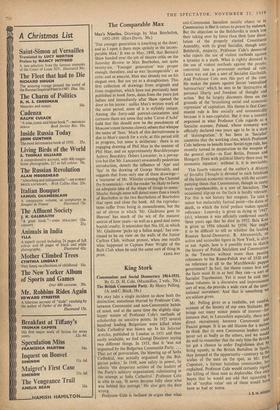King Stork
Communism and Social Democracy 1944-1931.
(A. and C. Black, 18s.) We may take a single incident to show both the distinction, sometimes blurred by Professor Cole, between Communist and non-Communist habits of mind, and at the same time the slightly slap- happy nature of Professor Cole's methods of scholarship on sensitive points. In 1925 several hundred leading Bulgarians were killed when Sofia Cathedral was blown up. In his Selected Articles, published in London in 1951 and thus easily available, we find Georgi Dimitrov saying two different things. In 1933, that it 'was not organised by the Bulgarian Communist Party.... That act of provocation, the blowing up of Sofia Cathedral, was actually organised by the Bul- garian police.' In 1948, now safely in power, he admits 'the desperate actions of the leaders of the Party's military organisation, culminating in the attempt at Sofia Cathedral.' Professor Cole is able to say, 'It never became fully clear /who was behind this outrage.' He also gets the date wrong.
Professor Cole is inclined to argue that what anti-Communist Socialists mainly object to in Communism is that it comes to power by violence. But the objection to the Bolsheviks is much less their taking over by force than their later disso- lution of the properly elected Constituent Assembly, with its great Socialist, though anti- Bolshevik, majority. Professor Cole's democrat who rejects the use of violent methods against a tyranny is a myth. What is rightly detested is the use of violent methods against the people, converted into a permanent method of rule. Lenin was not just a sort of Socialist Garibaldi. And Professor Cole sees this part of the time. He makes the points against Soviet 'centralised bureaucracy' which he sees to be 'destructive of personal liberty and freedom of thought and action.' But he largely discounts them on the grounds of the 'brutalising social and economic repression' of capitalism. His theme is that Com- munist rule is fine socially and economically because it is non-capitalist. But it was a country organised in what Professor Cole regards as a Socialist manner, Poland, whose economy was officially declared two years ago to be in a state of 'disintegration.' It has been in 'Socialist' countries that the working class, which Professor Cole believes to benefit from Soviet-type rule, has recently turned in desperation to the weapon of the general strike—in East Berlin, Poznan and Hungary. Even with political liberty there may be economic injustice : without it, it is inevitable.
This fourth volume of the author's A History of Socialist Thought is devoted to such fetishism of the formal economic structure, with the accom- panying thesis that Communism, though in manY ways reprehensible, is a sort of Socialism. The occasional slip-up on the facts is hardly relevant. For this is not history but exegesis. To take a minor but ineluctably factual point—the dates of death, to which the brief preface makes special reference : Lozovsky is given as dying in `194'/ (sic), whereas it was officially confirmed nearly three years ago that he died in 1952. Bela Kun is given as 1936 (should be 1939). Nor ought it to be difficult to tell us whether the leading Russian Social-Democrat, R. Abramovich, an a active and accessible figure in New York, is alive or not. Again, how is it possible even to sketch the history of Polish Socialism and Communism in the Twenties without more than passing references to the Russo-Polish war of 1920 and no reference at all to the Marchlewski puppet government? In fact, the theme comes first and the facts must fit in as best they can—a sort of Socialist Toynbeeism. Yet it must be said that these volumes, in a discursive and impressionist sort of way, do provide a wide view of the inter national movement. And that is something we are seldom given.
Mr. Pelting gives us a readable, yet careful, account of the history of our own Stalinists. f1.4 brings out many minor points of interest—far instance that, in Lancashire especially, there was direct recruitment between Communist and Fascist groups. It is an old illusion for a nation to think that its own Communist leaders could never act as badly as the others, and we would do well to remembtr that the only time the British lot got a chance to order Englishmen shot 131 firing squads, in the British Battalion in Spain, they jumped at the opportunity—contrary to the wishes of the men on the spot, as Mr. Fred Copeman, a former battalion commander, has explained. Professor Cole would certainly regard the killing of these men as deplorable. One only hopes, that he would not add that squeezing bit of 'surplus value' out of them would have been as bad or worse.
3. E. M. ARDO














































































 Previous page
Previous page